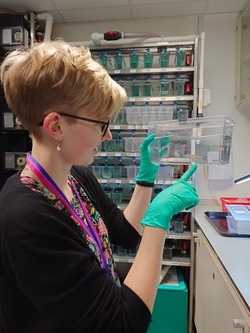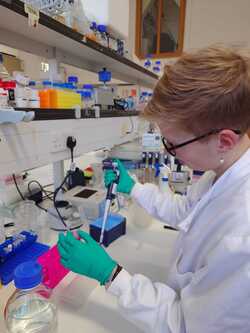Clara Mutschler, Postdoctoral Research Associate
What is your current role?
I have just finished my PhD within the Department of Clinical Neurosciences here at the University of Cambridge, and am now continuing this work as a postdoc here in the Department of Genetics.
When did you start with the department?
I have been doing part of my work here for the past four years, so since 2019.
How did you get started in science?
I don’t actually remember how I first became interested in science, but I remember thinking the brain is super fascinating and how weird it is that my brain is thinking that about itself. I then decided to do a degree in neuroscience – and here I am today, still fascinated by how all of this works, and more and more realising how little we actually understand so far.
What are you currently working on?
I am investigating neuron Schwann cell interactions after peripheral nervous system injury. When the nerves in our body get injured, they usually degenerate. At least in the brain, regeneration is then difficult, but in the periphery, so for instance in your arms and legs, the nerves can regrow. After injury the nerve cells, or neurons, communicate with a range of other cells in the nerve, including Schwann cells which are very important for regeneration and repair. I am trying to understand how these cells communicate after injury, so we can hopefully improve regeneration in circumstances where it doesn’t usually happen.
What has been a defining moment in your career?
My PhD has been a defining moment for me as it clarified not only that doing great science is really important to me, but that I also greatly value mentorship and supporting others in science. I worked with several groups during this time and really was able to see different leadership styles and the work it takes to build a supportive lab environment where everyone can thrive. This experience will shape how I approach my own career, and how I hope to contribute to the field and to future researchers.
What advice would you give to other women wanting a career in science?
Find good mentors and role models who have been where you are now, and are able to support you and your needs. Take on projects on the basis of your interest and passion rather than out of a sense that you need to prove you belong in your field. I also want to add that I think we’ve done a lot of work to make scientific research more accessible to women up to where I am now in my career; it’s important to go in with eyes open to the remaining challenges women face in attaining more senior academic positions.
What are your future goals, for yourself or for women in science?
Personally, I’m planning to continue my research in investigating neuron-glia interactions in health and disease. I hope to start my own lab after taking more time to develop my research interests and technical skills, and hope to then contribute to our understanding of how cells communicate with one another to create the wild complexity of the brain. For women in science more broadly, I hope that we continue to push for a more diverse and equitable academic environment; I’m conscious of the fact that many women leave academia after gaining higher degrees, and we need to address this issue. I also hope that we can rework expectations in academia to be more accessible to researchers without requiring them to have a spouse managing their household so that they can focus on research; the academic model is still very much designed for an affluent, able-bodied white man, and this doesn’t reflect the diversity that we need in scientific research (and everywhere else).


